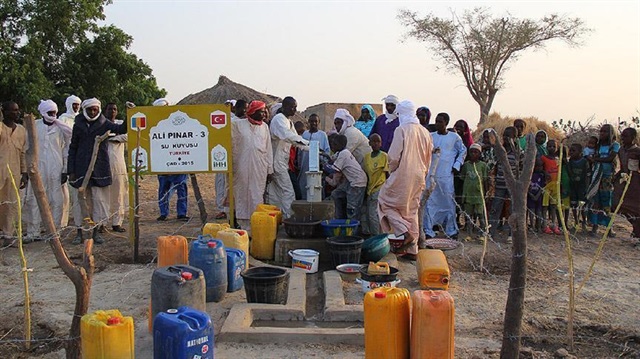

File Photo
Turkey-based aid foundations have opened over 8,800 water wells in Africa, Asia, Middle East
In a world where more than two billion people still lack access to clean water, Turkey is warming the hearts of people with its water well projects in Africa, Asia and the Middle East.
Turkey-based institutions were extending a helping hand to countries where hunger and drought-related issues remain endemic.
According to the data obtained by Anadolu Agency correspondents, 10 Turkish institutions have established 8,842 water wells around the world so far.
The Humanitarian Relief Foundation (IHH) opened 3,450 water wells in 30 countries, the Cansuyu Charity and Solidarity Organization opened 1,273 water wells in 13 countries, the Yardimeli International Humanitarian Aid Agency opened 1,129 wells in seven countries and the Hayrat Aid Foundation opened 872 wells in 17 countries.
Also, 590 wells were opened in 12 countries by the African Development and Cooperation Organization, 399 wells in eight countries were opened by the Sadakatasi Foundation, also the Doctors Worldwide Turkey opened 174 water wells in six countries.
The Istanbul International Cooperation and Aid Foundation opened 63 wells in Ethiopia, while the Deniz Feneri Association opened 832 wells in nine countries in three years.
The Association of the Friends of Africa also opened 60 water wells in five countries.
These institutions have also realized various water projects in the countries.
The Turkish Cooperation and Coordination Agency (TIKA) has put over 500 water wells into operation in five years and also realized several projects in Azerbaijan, Ecuador, Sudan, Cambodia, Niger and Tunisia, which support sustainable development and provide millions of people as well as fertile soil with water.
Turkish Red Crescent has completed six projects in Gaza, which will meet the water needs of 400,000 people, as part of the Gaza Strip Drinking Water Rehabilitation Project.
The Turkiye Diyanet Foundation dug 117 wells in 14 countries under the slogan “A Drop of Life”. Efforts for opening another 19 wells continue.
Water wells and projects have been opened mostly in Afghanistan, Bangladesh, Burkina Faso, Benin, Burundi, Djibouti, Chad, the Democratic Republic of Congo, Ethiopia, Ivory Coast, Ghana, Guinea, India, Iraq, Cameroon, Cambodia, Kenya, Liberia, Lebanon, Mali, Myanmar, Niger, Nigeria, Pakistan, Rwanda, Senegal, Sri Lanka, Sierra Leone, Syria, Somalia, Tanzania, Thailand (Pattani), Togo, Uganda, Yemen and Zimbabwe.
According to a report of the UN prepared in 2017 together with the UNICEF, 2.1 billion people worldwide remain unable to access clean water; there is no clean water in the houses of each three people out of 10 in the world.
Each year, 502,000 people lose their lives due to diarrheal illness caused by the use of polluted water and insufficient sanitation, the report said.
Also, 4.5 billion people lack sanitation and hygiene services, it added.
#Association of the Friends of Africa
#Cansuyu Charity and Solidarity Organization
#Hayrat Aid Foundation
#IHH
#TIKA
#Water wells

